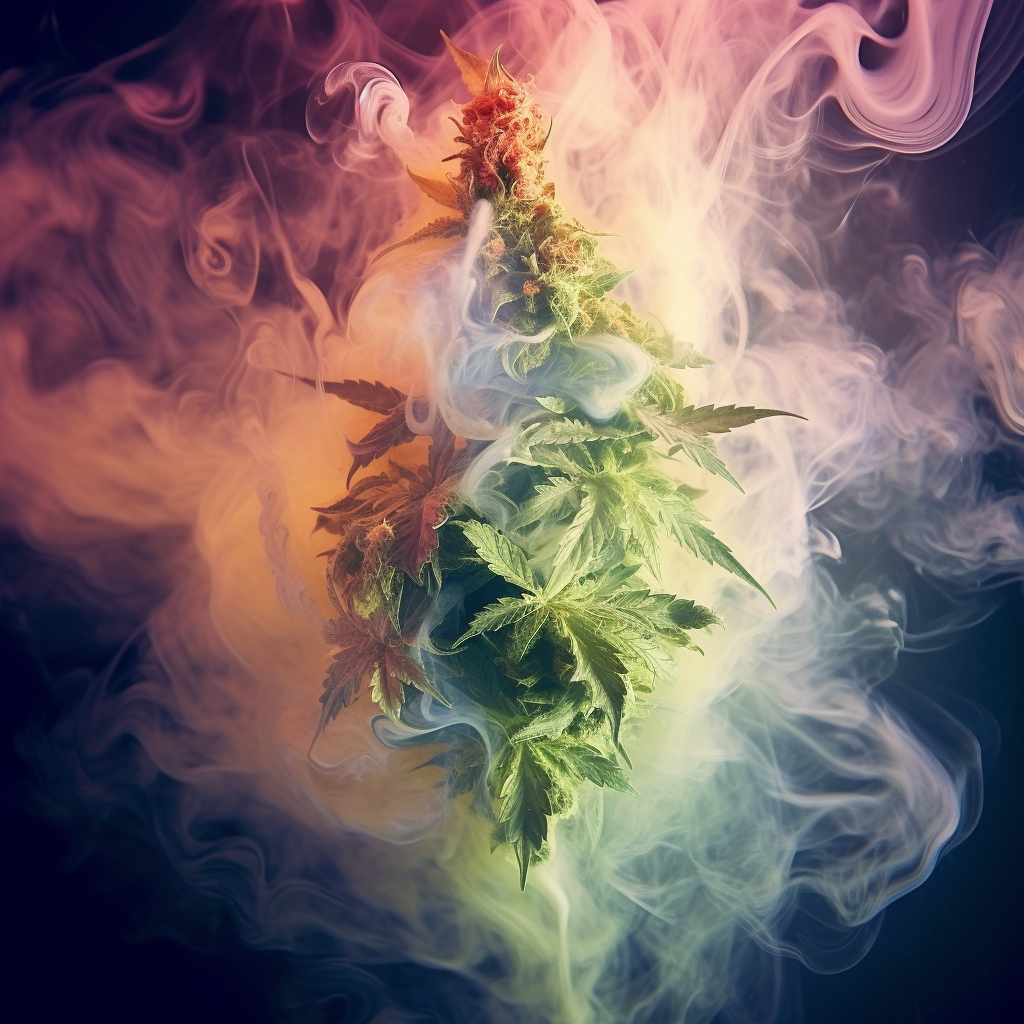There is a wide variety of fascinating experiences that can arise from consuming cannabis. One of the most notable effects lies in the way it influences our thoughts.
The thought world of a stoner – that is, the thoughts we have when we are actively under the influence of cannabis – can surprise us with its impressive changes. At times, they can be amusing or absurd, creative or seemingly brilliant, and sometimes even dark and frightening. Stoner thoughts can inspire us or completely confuse us. Their diversity is unpredictable and individual, as each person experiences them in a unique way. Nevertheless, they can largely be attributed to how THC and other compounds of cannabis influence the brain.
What secret lies behind the altered mindsets we experience during a cannabis high?
When we consume cannabis, our natural endocannabinoid receptors are activated by the diverse cannabinoids such as THC and CBD. This has a variety of effects on our body and mind. A significant effect of THC, the main psychoactive component of cannabis, is an increase in cerebral blood flow in specific brain regions.
In a study, researchers found that after THC consumption, many areas of the brain exhibited increased blood flow. It has been suggested that the changes in behavior and mental state associated with cannabis intoxication may potentially be related to increased cerebral blood flow and enhanced functional activity in certain brain regions.
Previous investigations by the same research team revealed that cerebral blood flow correlates more strongly with cannabis intoxication than the amount of cannabinoids in a person’s bloodstream.
In particular, the frontal brain region exhibited the most significant increase in cerebral blood flow after THC consumption. This region is responsible for essential brain functions. It is commonly believed that the frontal lobe controls our attention, abstract thinking, organizing behavior in relation to future goals, sensory processing, cognitive processes, decision-making, and initiation of motor activities. Given the significant cognitive abilities that the frontal lobe is responsible for, it is not surprising that strengthening this brain region through increased blood flow and associated enhanced functional activity can lead to completely different thoughts.
However, the frontal lobe is not the only area in the brain that contributes to such profound thoughts. The insula, which is involved in the perception of taste and sensory stimuli and mediates stress-related cardiovascular responses, also showed a significant increase in blood flow.
The researchers also found that the right hemisphere, which is associated with the processing of emotions, was significantly more activated than the left hemisphere. It is believed that the cingulate cortex, which also showed a high correlation between the increase in cerebral blood flow and self-reported THC intoxication, regulates the interactions between sensory information, emotions, and pain.
It is important to note that the effects described on cerebral blood flow and thought patterns are temporary and manifest within the acute intoxication state resulting from cannabis consumption. Long-term effects and potential negative alterations in blood flow due to chronic THC consumption require further investigation.
Overall, the changes in mindset during cannabis consumption can be attributed to the complex interaction between cannabinoids in cannabis, the endocannabinoid receptors in the brain, and cerebral blood flow. These effects can lead to a variety of thought patterns, ranging from humorous and creative to dark and frightening. The understanding of these processes is an ongoing area of research and contributes to a better comprehension of the effects of cannabis on human cognitive abilities.
The inspiring thoughts of cannabis users: Who experiences them and for what reasons?
Stoner thoughts can affect individuals who have consumed THC, but they are more likely to occur in some people than in others.
Studies have shown that individuals who have never consumed cannabis before or only do so infrequently tend to have more noticeable or extreme stoner thoughts compared to regular users. There is also the possibility that genetic or context-related factors play a role in influencing the thoughts induced by cannabis.
Dosage also plays a crucial role in determining the extent to which thoughts are altered. A low amount of cannabis can have completely different effects compared to a high amount. In the same mentioned study, participants who experienced a mild THC intoxication reported an increased sense of sociability and heightened relaxation. At higher doses, however, they exhibited less sociable behavior, impaired thinking ability, impaired memory, paranoia, and occasionally hallucinations. This supports the biphasic effect of cannabinoids described by scientists.
What thoughts typically arise in cannabis consumers?
There are a variety of ways in which our thoughts can change when we get high. In a study on the feeling of being high, the following changes were most commonly reported by the participants:
- Relaxation: One feels more relaxed than usual.
- Euphoria: One experiences an increased sense of happiness.
- Increased laughter: One tends to laugh more than usual.
- Altered sensory perceptions: Sensory experiences are perceived in a different way.
- Changes in time perception: The sense of time can be altered.
- Improved concentration and memory performance: The ability to concentrate and memory can be enhanced.
- Enhanced creativity: Creativity can be heightened.
- Deep thinking: One tends to contemplate things more deeply.
Additionally, participants who exclusively consumed cannabis reported different effects compared to those who consumed it in a group. Solo consumers reported milder effects, while group consumers experienced greater euphoria, laughter, and alertness.
On the other hand, there were also participants who experienced negative side effects and reported sensations as follows:
- Paranoia: A feeling of fear or distrust towards others.
- Anxiety: An intensified feeling of fear.
- Impaired concentration and memory: Difficulties in focusing and retaining information in memory.
- Hallucinations or visions: The experience of perceiving things that are not real.
Here are some of the more commonly reported ways in which the thoughts of cannabis users can manifest:
The fascinating world of thoughts while smoking cannabis
One symptom of cannabis consumption is the illusion of having the most brilliant ideas of one’s life, but the next day these ideas may appear less grandiose. While this may be the case for some individuals, others report actually having great ideas during the cannabis high. The science supports the possibility of this experience.
As mentioned earlier, the consumption of cannabis leads to increased blood flow to brain regions associated with various aspects of thinking and decision-making. This increased blood flow typically accompanies enhanced functionality. So, if you’re high, your brain could be brimming with ideas. In fact, over half of consumers report that cannabis enhances their creativity.
Some studies have shown that cannabis can enhance divergent thinking (a form of creative thinking), but these improvements were only observed at low doses. With excessive THC consumption, divergent thinking tends to decrease. This could be the reason why there are such varied reports on whether cannabis aids or hinders our brilliant creative thinking. Therefore, dosage is a crucial factor in any consumption.
Cannabis and the Smile in the Mind: Funny Thoughts and Their Connection
In a state of intoxication, one may find that everything they think about is extremely funny or absurd. The laughter triggered by almost anything is likely due to the increased blood flow to specific brain regions associated with laughter, particularly the right frontal lobe and left temporal lobe. When these regions become overactive, everything seems to be simply amusing.
Additionally, THC can also promote feelings of happiness, relaxation, and bliss, similar to antidepressants or anti-anxiety medications. These positive emotions can make it easier to laugh and enjoy the humor in life.
Dealing with anxiety, paranoia, and intrusive thoughts: Tips and strategies.
While many thoughts while being high can be pleasant or hilarious, there are also some extremely unpleasant ones. Cannabis can lead to anxious, paranoid, and negative thoughts that persistently linger in our minds and are difficult to shake off. People who regularly experience such thoughts typically do not find the state of being high enjoyable.
Cannabis has dual effects. It can induce relaxation, joy, and humor, but unfortunately, it can also lead in the opposite direction. With a high enough dosage, many of the positive effects can be reversed. A low dose can create a sense of happiness, while a high dose of the same substance can flip the switch and induce negative, anxious feelings. Since the ideal dosage varies from person to person, it is recommended to start with a low dose and gradually increase it.
Unexpected psychotic episode: Rare but intense
In rare cases, the consumption of cannabis can also induce temporary psychoses. Individuals who experience this report hallucinations, visions, and illusions. Some may believe they see moving objects or hear voices in indistinct sounds, such as the hum of a fan. However, in most cases, these effects are of short duration and diminish after the intoxication subsides.
Unfortunately, some research findings suggest that heavy consumption of THC-rich cannabis may be associated with an increased risk of schizophrenia, particularly among adolescents and young adults. However, it is important to note that this association is mediated by factors such as family history of mental illness, genetic predisposition, and childhood traumas. Researchers cannot definitively say whether cannabis can trigger long-lasting psychoses in some individuals or if it is merely associated with them due to other factors. Indeed, there are valid reasons for caution, particularly among younger individuals who consume cannabis.
After consuming cannabis: How long does the lingering feeling of being “high” last?
In studies examining the impact of cannabis on cognitive function, most brain regions demonstrated significant changes within 60 minutes of low-dose consumption. In contrast, with higher dosages, changes were observed as early as 30 minutes and continued at 60 minutes, with the peak effect occurring at the 30-minute mark.
It is important to note that the extent of the effects can vary from person to person, and some individuals may require more or less time to feel the “high” sensation. Additionally, the method of consumption can have an impact on the timing as well. For example, smoked or vaporized cannabis, as well as novel fast-acting edibles, tend to have a quicker onset of effects on the body compared to traditional edibles.
How long do the effects of cannabis consumption last?
Stoner thoughts can vary from person to person, but the main factor that influences their duration is the method of consumption.
Compared to other methods like vaporizing or smoking, traditional edible products can have longer-lasting effects. That’s why they also provide a longer duration for stoner thoughts. In most cases, stoner thoughts should subside within a few hours after the peak THC concentrations in the brain have been surpassed. However, it is known that the effects of edible products can last up to 12 hours or even longer.
There are anecdotes on the internet suggesting that effects lasting 24 hours are unusual but can still occur. This is sometimes referred to as a “weed hangover.” While it is uncommon, extended effects can occur, especially in individuals with a unique THC metabolism or after consuming a very high dose. Once the intoxicating effects subside, the intense thoughts should generally fade away as well.
In rare cases, cannabis has been associated with psychosis episodes that can last longer than the intoxication period. However, these episodes tend to diminish when cannabis consumption is discontinued. Unfortunately, there is an increased risk of being diagnosed with schizophrenia later in life if such episodes occur. While scientists do not fully understand the exact relationship, caution should be exercised when experiencing such episodes.
There is also a rare and poorly understood phenomenon known as depersonalization, which can occur in some individuals after consuming THC. Any persistent change in emotional state following consumption should be taken seriously, and it is recommended to seek the advice of a psychologist.
Keeping a clear mind: Tips for dealing with negative thoughts while getting high.
While there is no direct control over the direction of thoughts when getting high, there are some strategies to make the experience positive and productive:
1. Consider your mindset and attitude. This often overlooked step can have a significant impact on the state of being high, including the purpose of consumption and the environment you are in.
2. Experiment with the CBD:THC ratio. High-THC cannabis (Type I) is the most common, but it can be challenging to accurately assess the dosage. For individuals who may experience unwanted stoner-like thoughts, it is advisable to try cannabis with a higher CBD content (Type II or Type III), as CBD can influence the effects of THC.
3. Find the right dosage. The optimal dosage of cannabis is individual and depends on factors such as tolerance, age, gender, and unique genetic characteristics. For example, the appropriate dosage for functional pain relief during the day may differ from a relaxing dose before bedtime, such as when practicing Yoga Nidra.
By considering these strategies, you can have more control over your experience when consuming cannabis and potentially achieve a more enjoyable and productive outcome.


